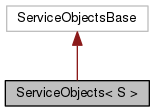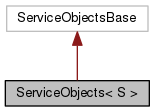CppMicroServices
Allows multiple service objects for a service to be obtained. More...


Public Member Functions | |
| S * | GetService () const |
| Returns a service object for the referenced service. More... | |
| void | UngetService (S *service) |
| Releases a service object for the referenced service. More... | |
| ServiceReference< S > | GetServiceReference () const |
| Returns the ServiceReference for this ServiceObjects object. More... | |
Detailed Description
template<class S>
class ServiceObjects< S >
Allows multiple service objects for a service to be obtained.
For services with prototype scope, multiple service objects for the service can be obtained. For services with singleton or module scope, only one, use-counted service object is available. Any unreleased service objects obtained from this ServiceObjects object are automatically released by the framework when the modules associated with the ModuleContext used to create this ServiceObjects object is stopped.
- Template Parameters
-
S Type of Service.
Member Function Documentation
|
inline |
Returns a service object for the referenced service.
This ServiceObjects object can be used to obtain multiple service objects for the referenced service if the service has prototype scope. If the referenced service has singleton or module scope, this method behaves the same as calling the ModuleContext::GetService(const ServiceReferenceBase&) method for the referenced service. That is, only one, use-counted service object is available from this ServiceObjects object.
This method will always return NULL when the referenced service has been unregistered.
For a prototype scope service, the following steps are taken to get the service object:
-
If the referenced service has been unregistered,
NULLis returned. - The PrototypeServiceFactory::GetService(Module*, const ServiceRegistrationBase&) method is called to create a service object for the caller.
-
If the service object (an instance of InterfaceMap) returned by the PrototypeServiceFactory object is empty, does not contain all the interfaces named when the service was registered or the PrototypeServiceFactory object throws an exception,
NULLis returned and a warning message is issued. - The service object is returned.
- Returns
- A service object for the referenced service or
NULLif the service is not registered, the service object returned by a ServiceFactory does not contain all the classes under which it was registered or the ServiceFactory threw an exception.
- Exceptions
-
std::logic_error If the ModuleContext used to create this ServiceObjects object is no longer valid.
- See also
- UngetService()
|
inline |
Returns the ServiceReference for this ServiceObjects object.
- Returns
- The ServiceReference for this ServiceObjects object.
|
inline |
Releases a service object for the referenced service.
This ServiceObjects object can be used to obtain multiple service objects for the referenced service if the service has prototype scope. If the referenced service has singleton or module scope, this method behaves the same as calling the ModuleContext::UngetService(const ServiceReferenceBase&) method for the referenced service. That is, only one, use-counted service object is available from this ServiceObjects object.
For a prototype scope service, the following steps are take to release the service object:
- If the referenced service has been unregistered, this method returns without doing anything.
- The PrototypeServiceFactory::UngetService(Module*, const ServiceRegistrationBase&, const InterfaceMap&) method is called to release the specified service object.
- The specified service object must no longer be used and all references to it should be destroyed after calling this method.
- Parameters
-
service A service object previously provided by this ServiceObjects object.
- Exceptions
-
std::logic_error If the ModuleContext used to create this ServiceObjects object is no longer valid. std::invalid_argument If the specified service was not provided by this ServiceObjects object.
- See also
- GetService()
Generated on Tue Oct 6 2015 for C++ Micro Services 2.99.0 by Doxygen 1.8.9.1

